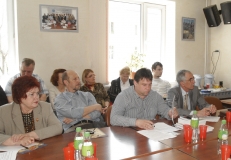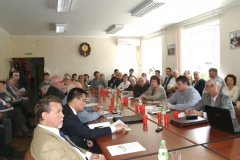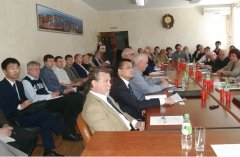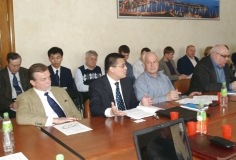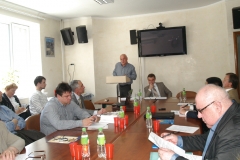The following problems were to be discussed at the meeting:
- Pacific Russia in the light of global and regional policy of China.
- Economical impact of China and its presence in the Far East of Russia.
- Demographic factor: the Chinese in contemporary Pacific Russia.
- Criminal element of the Chinese presence.
- Cultural influence of China: ways, forms, results.
The chairperson of the meeting was Dr.Sc. Professor Victor L. Larin, IHAE Director.
The first speaker was the deputy Consul General of China in Khabarovsk Mr.Yui Jinzyun He pointed out that China-Russian relations are considered to be on the highest level at the current time. The volume of trade is gradually increasing. However. the potential of mutual cooperation between both countries in the fields of high technology, power engineering and other areas, has not been completely realized.
The speech of Can.Sc. N.I. Fokin( FEFU Associate. Prof.) was dedicated to the economic presence of China in the Far East of Russia. In particular, the speaker focuses on the dominance of Chinese goods at the Far Eastern markets resulted in growing concerns among the citizens, as well as politicians and scientists. However, revaluation of the yuan, the growing incomes of the population and cost of labour forces in China will inevitably lead to the increasing cost of Chinese products and, consequently, the further gradual decreasing of merchandise volume in the region.
Can.Sc. A.V.Druzyaka ( associate Prof.of Blagoveschensk State Pedagogical University) in his report on “ The Demographic factor: the Chinese in contemporary Pacific Russia” indicated that the existing scarcity of labour forces is being offset at the expense of migrants from CIS, China and DPRK. The growth of foreign minority groups arouses concerns among residents and sets up the concept of “yellow threat”, especially regarding Chinese migrants. However, unbiased analysis of the data shows that Chinese migration has minor impact on the demographic development of the region, e.g., in 2001 only 89 citizens of China received residence permits in the Amur Region. The number of Chinese people working in commerce is reducing but, on the contrary, the number working in logging and other industries is increasing.
Can.Sc. N.I. Barannik, Primorsky Branch of Ministry of Justice of Russia, Deputy Chief, reported on existence of Chinese criminal groups in the light of organized crime in the region. The reporter emphasized that they had traced the main areas involving the Chinese criminal groups, such as drug trafficking, species of wild flora and fauna, biological resources, ferrous and nonferrous metals, etc. However, criminal element of the Chinese presence in the Far East is at the low level at large.
The report of Cand.Sc. D.A. Vladimirova ( Associate Prof. FEFU) deals with
cultural influence of China. She noted that it became ordinary for the residents of the Russian Far East to visit Chinese restaurants, to use the achievements of Chinese medicine. Confucius Institutes also carry out an important advocacy tasks. At present, there is a tendency towards developing informative tourism, instead of commercial one.
Photo album:



